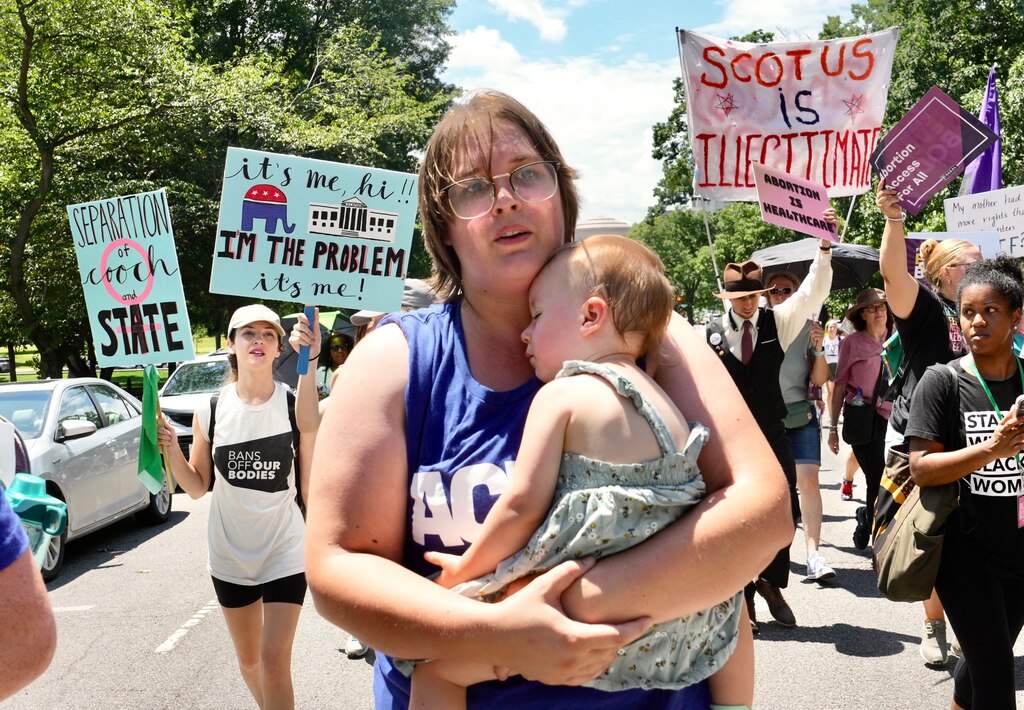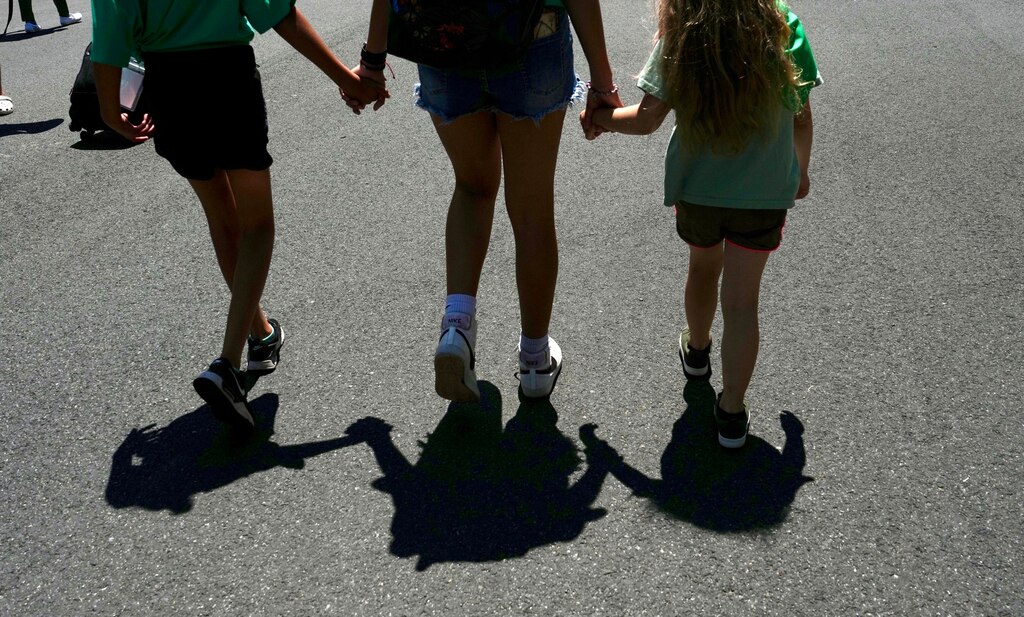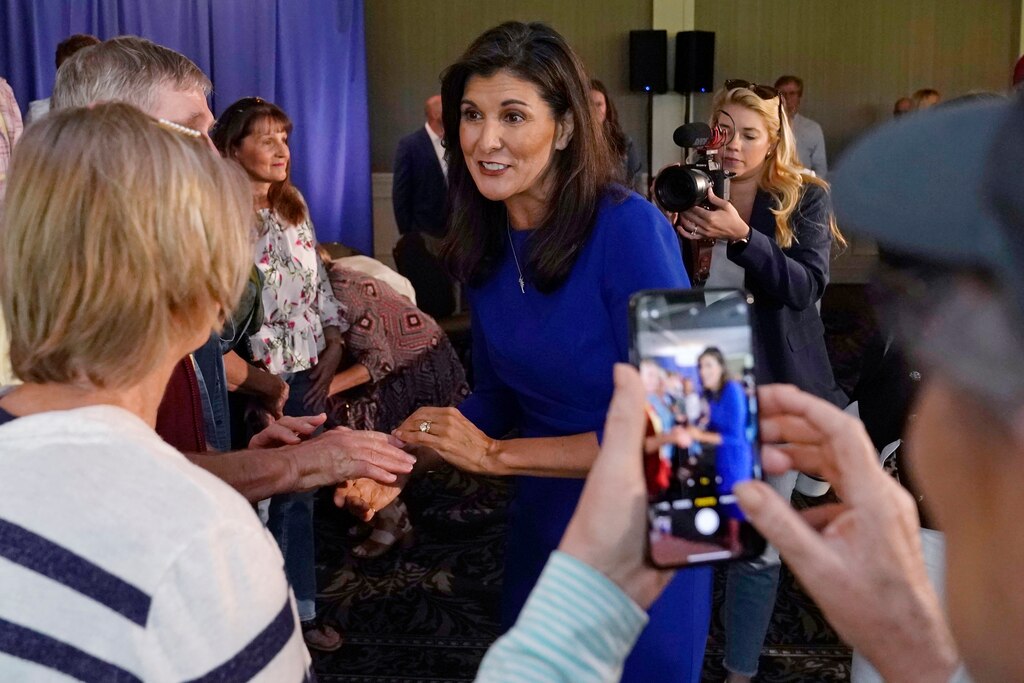Activists and politicians are marking the one-year anniversary of the U.S. Supreme Court ruling that overturned a nationwide right to abortion with praise from some and protests from others.
Advocates on both sides marched at rallies Saturday in Washington and across the country to call attention to the Dobbs v. Jackson Women’s Health Organization ruling on June 24, 2022, which upended the 1973 Roe v. Wade decision.
“I’m absolutely livid that people think that they can interfere with medical decisions between a woman and her doctor,” said Lynn Rust of Silver Spring, Maryland, at a Women’s March rally in Washington.
In Chicago, dueling rallies gathered on opposite sides of a street outside a downtown federal building. There was shouting but no reports of clashes.
“The elected officials in Illinois are trying to turn us into the abortion capital of the middle of the country,” Peter Breen, vice president of the conservative Thomas More Society, told the Chicago Tribune.
Andy Thayer of the Gay Liberation Network said people in Illinois who are pro-abortion rights can’t be complacent because conservative judges have been appointed to key court positions.
“That’s why we have to be in the streets,” he said.
On Saturday, Stacey Ezersky and Leigh Starling, longtime friends who have attended past marches together, took the MARC train from Baltimore to Washington to take part in the Women’s March.
“It’s important to have our voices heard because what’s happening in our country is terrifying and we’re inching toward fascism and we want to do whatever we can to preserve the rights of vulnerable people, like women and gays and lesbians and trans people and everyone,” said Ezersky, 60.
Starling, 59, recalled that her mother wasn’t happy when the Supreme Court legalized abortion in 1973, because she followed the teachings of the Catholic Church. As Starling grew older, she said, she became more aware and stopped going to church.
“I stopped participating in those oppressive religions, well what I consider oppressive religion, and I just became more of my own self and recognizing choice,” she said.
They were among hundreds who marched from Washington’s Union Station to the Supreme Court Building, carrying signs such as “My mother had more rights than my daughter” and “Bans off our bodies.” There, they encountered a smaller group of anti-abortion demonstrators.
Alissa Greenwood of Bowie marched with her 18-month-old daughter, Beckett. “This is just one of many marches she has been on,” Greenwood said. “She was born around the time they started discussing the overturn.”


The Dobbs decision made abortion an unavoidable campaign issue and deepened policy differences among the states.
Most Republican-controlled states have imposed bans, including 14 where laws in effect now block most abortions in every stage of pregnancy, with varying exceptions for the life and health of the woman and for pregnancies resulting from rape or incest. Most Democratic-led states have taken steps to protect abortion access, particularly by seeking to protect doctors and others from prosecution for violating other states’ abortion bans.
The issue is far from settled, as demonstrated by Saturday’s rallies and the past year’s battles that have played out in courtrooms, on ballots and in state legislatures.
Judges are still weighing whether the bans and restrictions in several states comply with state constitutions. As soon as this fall, more voters could decide directly on abortion-related policies; last year, they sided with abortion rights in all six states with measures on the ballot. And the issue will be on the ballot in elections this year and next.
Vice President Kamala Harris spoke about the impact of the Dobbs ruling in Charlotte, North Carolina.
“We knew this decision would create a health care crisis in America,” she said, pointing to women who were initially denied abortion access even during miscarriages because hospitals were concerned about legal fallout.
The laws restricting abortion “in design and effect have created chaos, confusion and fear,” Harris said.
Although there’s far from a universal consensus among voters, public opinion polls consistently have found a majority opposes the most restrictive bans but also opposes unchecked abortion access at all stages of pregnancy.
President Joe Biden has pushed for a national law to reinstate abortion access. Republicans have called for a national ban. This week, former Vice President Mike Pence, who is seeking the 2024 GOP presidential nomination, is calling for his party’s presidential candidates to join him in backing a ban after 15 weeks of pregnancy.
With Democrats controlling the presidency and U.S. Senate and Republicans holding the House, no federal change is imminent.
Nikki Haley, another GOP presidential candidate and former ambassador to the United Nations, said she backs a federal ban but it doesn’t have enough support to advance. Speaking at the Faith and Freedom Conference in Washington, Haley said both parties should instead look to goals such as limiting abortion later in pregnancy. Only a half-dozen states allow abortion at any point in pregnancy, and abortions after 21 weeks or so are rare.
“We need to make sure that our country stops demonizing this issue and we humanize this issue,” Haley said. “This is personal for everyone.”

These policies have vast practical implications.
In states with the deepest bans, the number of abortions has plummeted to nearly zero. There have been more abortions in states where access has been maintained — especially those closest to those with bans, as women travel for care they used to get closer to home.
“I can’t tell you how many people arrive at the clinic utterly exhausted after driving all night from Georgia, Tennessee, Louisiana,” said Amy Bryant, a doctor who provides abortions at a clinic in Chapel Hill, North Carolina.
There’s also been a rise in use of networks that distribute abortion pills.
But because of lags and gaps in official reporting — and because some of the pill use goes unreported — the impact on the total number of abortions in the U.S. is not clear.
Although abortions have continued, advocates say there’s an equity problem: Black women and lower-income women especially, they say, are those who were expected to lose access.
“Seeing how it impacts everyone in the country, but especially the people who are already at a disadvantage and don’t have that access, is really scary,” Larkin O’Gorman, a Washington resident, said at the Women’s March.
In Maryland, elected officials have been outspoken in support of abortion rights.
Gov. Wes Moore marked the first anniversary of Roe v. Wade being overturned by visiting a Planned Parenthood clinic and pledging to keep the state a safe haven for abortion care.
“The forces that are actively working to roll back rights, they are busy now. … The thing we are really standing in unison and saying is: Not in Maryland,” the Democratic governor told The Baltimore Banner after touring the Annapolis clinic Friday.
Planned Parenthood Maryland has seen an influx of patients from other states seeking reproductive and abortion care since last summer’s ruling, said Karen J. Nelson, the organization’s president and CEO.
Maryland law has protected the option to continue or end pregnancies since the early 1990s, following a voter referendum.
In the 2024 election, Marylanders will vote on whether to enshrine those same protections in the state constitution. Although that wouldn’t effectively change the legal status or access to abortion, a state constitutional amendment would be harder to undo, should Maryland’s political makeup shift in the future. Polling has shown consistently strong support for abortion remaining legal in Maryland.
Maryland lawmakers in 2022 set aside money in the state budget to provide training in abortion care to medical professionals. After former Gov. Larry Hogan, a Republican, declined to spend the money, Moore released it on his first day in office.
Moore and state health officials also recently stockpiled drugs used in medication abortions, concerned that access to those drugs could be limited as their approvals are challenged in court.
The next front, Health Secretary Laura Herrera Scott said, is ensuring access to contraceptives that prevent pregnancy. She declined to provide details on what Maryland might pursue — the legality of contraceptive use is believed to be covered by Maryland law and the proposed constitutional amendment — but said “that’s something we’re actively pursuing.”
Mulvihill reported from Cherry Hill, North Carolina. Associated Press journalists Stephanie Scarbrough and Will Weissert in Washington and Michael Tarm in Chicago, as well as Banner staff writers Kaitlin Newman and Pamela Wood, contributed to this article.



Comments
Welcome to The Banner's subscriber-only commenting community. Please review our community guidelines.